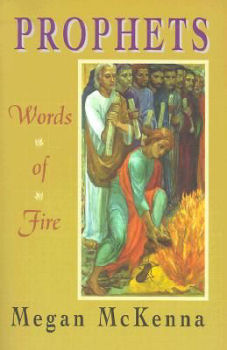
|
Posted March 1, 2009
Book: Prophets: Words of Fire Author: Megan McKenna Orbis Book. Maryknoll, NY. 2001. Pp. 271 An Excerpt from the Jacket:
We often search among different spiritualities for guidance on how to lead our lives and how to find that kernel of truth, forgetting that all were originally derived from Scripture — the words of Scripture pronounced by the prophets and then again by Jesus, the last prophet. Drawing on Scripture and a treasure house of stories, especially from the Jewish tradition, McKenna breathes life into th prophets and opens their messages to us. An Excerpt from the Book: Moses: The Prophet-Liberator Once upon a time a rabbi was lecturing on a point of the law and he noticed that a good number in the audience were falling asleep, nodding in their chairs. He was losing them! He had to rouse them, so he cried out: “Once upon a time a woman in Egypt gave birth to six thousand children all at once!” Immediately the group stirred, and one of the students, Rabbi Ishamael ben Yose, asked him: “Who in the world could that be?” And the rabbi soberly answered: “It was Jochebed, when she gave birth to Moses, because he is equal to six thousand people!” For many in the Christian community, the prophet par excellence is Elijah, who disappeared in a fiery chariot and will return as forerunner to the presence of the Messiah among us. But for the Jewish community, the prophet is Moses, the one who liberated Israel from the bondage of Egypt and led them to freedom. He is the prophet of memory: the memory of what Yahweh has done and is doing for his people in the covenant and the law. The story of Moses and the law are Israel’s heritage. When the story is told and the law obeyed, the captivity and oppression of Egypt will never happen again. God’s intent is to prevent another Egypt. The story of Moses is the story of the birth of Israel, the emergence of a people dedicated to the worship and remembrance of God in the world. Moses’ message tells of power, where true power lies, how it is used, and on whose behalf. In a sense, Moses introduces the people of Israel to the reality of the one God. He singles out the most dramatic and powerful of God’s characteristics, that God is the champion of the losers, on the side of those imprisoned and oppressed by other forms of power that do not serve life. From the beginning this God is like no other on earth. Dorothee Solle, a German peace activist and theologian, wrote about the unique character of the God of Moses: When our religions ask where God is to be found, they answer with many names. Some stress silence, the solitariness of the heart, the sinking into the collective unconsciousness. The biblical tradition has added another name to the names of God, a name that seldom appears in other faiths. This name is the name of righteousness, justice. It is the heart piece of our Jewish and Christian tradition. Without it, there can be no prayer, no incense, no mysticism or baptism. Without the poor, there is no closeness to God. We find our way to God by doing justice, for justice is God’s will. Because it centers on justice, the Bible speaks incessantly of the poor. It warns us that the riches we heap up not only separate us from the poor but also disguise us from God and bar the way to God. And so God is always fundamentally involved with our economic order, and God’s concern lies with the poor. Table of Contents: 1. The prophet 2. Moses: the prophet-liberator 3. Elijah and Elisha: the prophet and his disciples 4. Amos and Hosea: the northern prophets 5. Jeremiah and Zephaniah: the long march to Jerusalem — the temple of destruction and exile 6. Micah and Isaiah: the southern prophets 7. Lamentations and Ezekiel: the pain and hope of exile 8. Second Isaiah 9. Third Isaiah, Haggai, Zechariah, and Malachi: the prophets of the return 10. Nahum, Habakkuk, Obadiah, Jonah, Nehemiah, Ezra, Daniel, Joel: the prophets not included. 11. Contemporary prophets: “Would that all Yahweh’s people were prophets |
|
